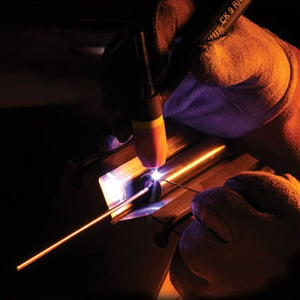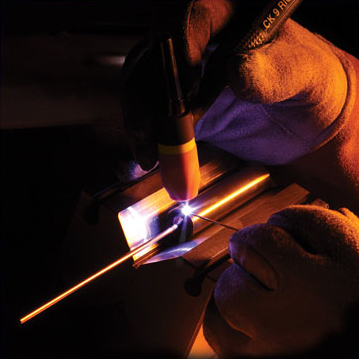In addition to providing on-demand help with the challenging task of joining metals of varying thickness and geometry, an expert contract welding partner provides many other side benefits. Welding is often at the middle to near the end of a fabrication process, but through their expertise in welding techniques, a contract welding partner understands the process steps that occur before and after that operation – adding well-rounded expertise to your process engineering.
Types of Expertise
Certifications provide confidence that a contract welder is capable of performing a task in that area. These certifications, such as AWS D17.1 for aerospace applications, also offer confidence that manufacturers follow industry regulations, standards, and specifications throughout the fabrication process.
Customers count on a contract welders’ expertise for manufacturability and part assembly and leverage them to consult on the design engineers’ prescribed assembly process. In this way, the contractor interprets how to best apply the weld specification for the process.
In addition to their expertise with design feedback, contract welding partners can advise on the most efficient way to fixture a part for consistent welds and more efficient welding processes. Contract welders have the background to know how to weigh everything from the skill of the technician to the difficulty of the process to the complexity of the part, which creates an efficient weld fixture that maximizes repeatability of a high-integrity weld joint.
Manufacturing Process Evaluation
Though not responsible for the product design, contract welders can provide feedback on the execution of a design, the process operations and their sequence during fabrication, and the dimensional tolerancing scheme specified by engineering. The most effective process engineers iterate with contract welders to converge on the best process to make a part. This approach minimizes risk and can reduce the time needed to complete an assembly.
Breadth of Capability
Many contract welders typically have a deep experience within a niche, or specialization within several niches. This diversification provides a broadened know-how that can help get a job done correctly and efficiently.
 Superior Joining Technologies provides LBW and GTAW of parts from 1/16” to 60” diameter. Having multiple core competencies allows us to evaluate a specified process to determine whether it truly is the best choice. For example, though GTAW might be called out on an engineering drawing, part quantities, torch head access, or another limiting factor, might make Micro LBW a better option than GTAW. We help to educate our customers on how and when to use each technique, providing them with a more consistent and better-performing part, as well as additional process knowledge to help them with future projects.
Superior Joining Technologies provides LBW and GTAW of parts from 1/16” to 60” diameter. Having multiple core competencies allows us to evaluate a specified process to determine whether it truly is the best choice. For example, though GTAW might be called out on an engineering drawing, part quantities, torch head access, or another limiting factor, might make Micro LBW a better option than GTAW. We help to educate our customers on how and when to use each technique, providing them with a more consistent and better-performing part, as well as additional process knowledge to help them with future projects.
The best way to implement a contract welder is to present them with the design as planned, walk them through the intended manufacturing process, and let them provide feedback on how the part goes together. This meeting should happen early enough in the process that if the contractor has recommended changes, engineers can modify the timeline and process map to include the assembly improvements. The contract welder asks guiding questions to help you understand the pros/cons of each processing technique, optimizing the fabrication of your part.
Superior Joining Technologies, Inc. is ISO 9001:2015, AS9100, Nadcap 1100, AWS D17.1 and D1.1, ASTM E1417, and E1444 certified. They provide contract welding services for the aerospace and defense industries. Competencies include Gas Tungsten Arc Welding (GTAW), Laser Beam Welding (LBW), and Resistance Welding, in addition to 6-axis Laser Cutting and Laser Part Marking processes. SJTI is certified in ISO 9001:2015, Nadcap-accredited for PT, MT, GTAW and LBW, FAA Repair Station OP Spec for Fusion Welding, PT and MT.







